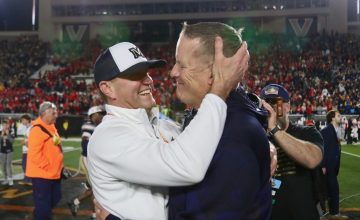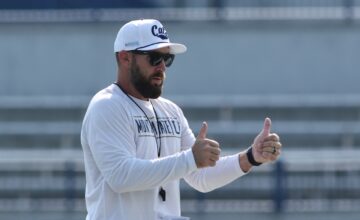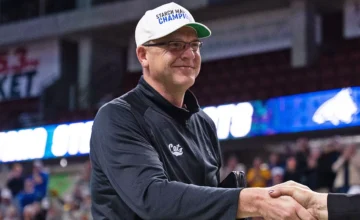Editor’s Note: This is the third installment in a four-part series breaking down the contracts for the coaches of the revenue sports at Montana State University. The third installment addresses the three-year contract given to head men’s basketball coach Brian Fish in the spring of 2015.
The Bobcats put their faith in Fish right off the bat.
When Brian Fish was hired to become the head coach of Montana State’s men’s basketball team, he was awarded a three-year contract right away. Three-year deals have become more the rule than the exception since the Montana Board of Regents approved their existence. But Fish was a first-time head coach taking over a program that seemed to be losing traction across the board.
Fish’s first contract pays him a base salary of $145,000 with guaranteed bonuses for fulfilling media responsibilities of $17,500 — $10,000 for radio appearances and $7,500 for television— and a courtesy car. Fish’ contract, which began on August 11 of 2014 and expires June 30, 2017, outlines job requirements such as maintaining the athletic department’s allotted budget for men’s basketball, attending social events, booster golf tournaments, public speaking engagements, media interviews and summer camps. The contract requires first aid and CPR certification and states the primary goal for Fish is “the graduation of student-athletes.”
If renewed, the renewal must take place by March 30 of 2017.
In his first season, Fish’s team struggled on the court but excelled off of it. Last calendar year, the Bobcat men’s basketball team posted an Academic Progress Rating of 946, bringing the four-year average to 933. In the classroom, the team posted a 3.18 grade-point average.
On the court, Fish’s first season defined a rebuilding year. Following Brad Huse’s eighth and final season, the Bobcats graduated four seniors and saw the defection of several other players. The program did not bring it its usual haul of junior college players. Fish was not hired until April 1, giving him just a few weeks to sign a class of incoming freshmen for the upcoming campaign. Kavell Bigby-Williams, a stud recruit from the United Kingdom, failed to qualify, creating a domino effect that caused Quinn Price and Bradley Fisher to play as true freshmen.
The team finished the season 7-23, a record made even harder to swallow considering it contained a three-game winning streak in December and the program’s first road sweep in a decade in February. MSU lost 14 straight games at one point during the Big Sky Conference grind and finished outside the Big Sky Tournament for the second straight season.
Despite the on-court struggles, Fish still achieved several of the performance bonuses in his contract. For his team’s GPA for each semester, he received a $2,500 bonus, then a $5,000 bonus at the end of the year.
If he can get MSU’s four-year APR to 950, he’ll receive a $10,000 bonus. Single-year scores of 960 or higher in each of the three years of the contract will net him $5,000 a piece.
Fish also met his bonus of serving all promotional, social and public speaking duties required of him by the athletic department, raising his earnings in 2015 to $185,000.
The contract also includes bonuses for increased attendance and on-court performance. Using a base of $150,000, Fish could receive $5,000 bonuses for raising ticket sales from between $180,001 and $225,000 and $225,001 to $275,000. Any increase beyond $275,001 would net a $7,500 bonus.
His on-court bonuses include: $7,500 for winning Big Sky Conference Coach of the Year; $5,000 for earning regional or national Coach of the Year honors; $7,500 for winning the Big Sky regular season championship; $5,000 for earning an NCAA Tournament bid; $2,500 for earning an NIT bid; $10,000 for advancing to the Final Four; and $25,000 for winning the NCAA title.
Winning between 20 and 23 games, including the postseason, would earn Fish $5,000. Winning between 24 and 28 games would net $5,000 more. Winning 29 or more games would earn Fish $7,500.
If the Bobcats were to achieve all the academic and athletic-based baselines, Fish could receive as much as $305,000 in a fiscal year. He can also supplement his income and the income of his assistants with any profit earned during summer basketball camps conducted at Montana State.
Fish can also supplement his income by doing any promotion or endorsement for athletic products as long as he reports all the income to MSU each year. He can also enter into an agreement with providers of athletic equipment and apparel pending the approval of the MSU athletic department.
Other clauses in Fish’s contract include: he must inform MSU athletics if he is looking for other jobs if more than six months remain on his existing deal; Fish must provide income and revenue statements for the program each September; Fish can be terminated at any time but must be provided written notice and given a week to appeal; If fired, Fish would still receive a pro-rated salary until the contract’s completion but he would have to pay back all liquidated damages that stem from his termination; and Fish would receive all performance-based incentives owed to him at the time of his termination or resignation.
During Fish’s first season, Kenya Crandell served as Montana State’s assistant head coach. Crandell has been a college assistant coach since 1997 with stops at Nebraska-Kearney (his alma mater) until 2000, followed by a season at Northern Colorado, seven seasons at Nebraska-Omaha, a season at Sacramento State and four more at Southern Utah. He spent the two seasons before coming to MSU as the director of basketball operations at Oregon where Fish served on Dana Altman’s staff for four years. He is Fish’s top paid assistant with an annual salary of $60,000.
Chris Haslam is the lone holdover from Huse’s staff. Next season will be Haslam’s third at MSU and his second on Fish’s staff. The former Wyoming Cowboy and 13-year professional with stops in Greece, Italy, Germany, Belgium, the Czech Republic and his native Great Britain is MSU’s primary big man coach. Haslam earned $56,116 annually.
Brandon Lincoln played at Oregon from 2003 until 2006 before spending 2010-2012 as a graduate assistant. In 2013, he spent a season as the director of video operations at Miami (Ohio) before returning to be the assistant conditioning coach for Altman’s staff the season prior to coming to Bozeman. Lincoln makes $40,000 annually.















